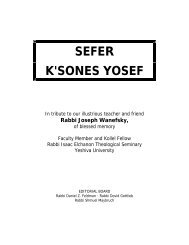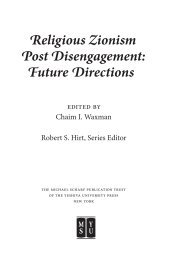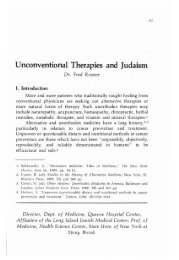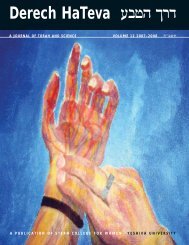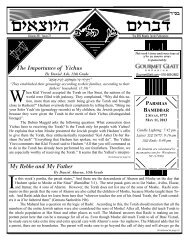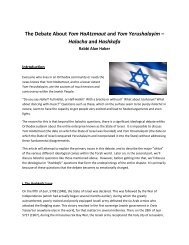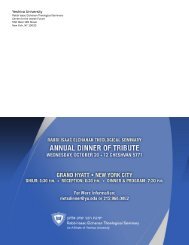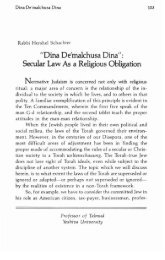Volume 15 - RJJ Journal of Halacha and ... - YU Torah Online
Volume 15 - RJJ Journal of Halacha and ... - YU Torah Online
Volume 15 - RJJ Journal of Halacha and ... - YU Torah Online
- No tags were found...
You also want an ePaper? Increase the reach of your titles
YUMPU automatically turns print PDFs into web optimized ePapers that Google loves.
CANNED TUNA"the particular fish in question itself has never been examined forthese characteristics.6,1Still, even though each fish need nol be examined as long aswe know that it belongs 10 a kosher species, Ihe question arises thaicanned tuna is a tolal unknown to us, for all traces <strong>of</strong> fins <strong>and</strong>scales have been removed along with the skin. How can we be surethat the can contains tuna? Can we rely on the inspection <strong>of</strong> theGentile factory workers in Puerto Rico? We know that thetestimony <strong>of</strong> a non-Jew in kashrut matters is generally not accepted.Let us, however, consider the question from a different vantagepoint.D. No craftsman willingly jeopardizes his livelihood.It is a wel1~established halachic principle that although we maynot rely on the evidence <strong>of</strong> a non-Jew relevant to the kashrut <strong>of</strong> afood item, yet if can be certain that he is telling the truth, in certaincases we may rely on him. Jewish law operates on the principle thatevery individual, including the non-Jew, is concerned withmaintaining his reputation as a reliable craftsman or worker; it isnot worth it to him to endanger his livelihood by selling an object6. See D",rkei Ttshuvah 83: he notes that according to Minchal Chin",h(Mitzvah <strong>15</strong>4). one who ate a fish <strong>and</strong> examined it only for the presence <strong>of</strong>fins but did not search for scales, has violated the precept <strong>of</strong> inspecting a fishfor its kosher traits. Darkei Tnhuvllh, however, comments that this appliesonly to a fish which is not recognizable to us as being <strong>of</strong> a kosher species.But if we discern that it is <strong>of</strong> a kosher species, then all concur that it isunnecessary to check it for kosher characteristics on every occasion.Darkei Telh"vllh 79 reiterates this position when dissenting from SeferHIlCltinuclt (Mitzvah <strong>15</strong>3), who states that it is a positive precept to e::



